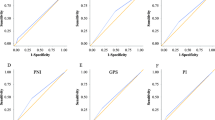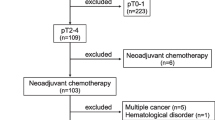Abstract
Background
The presence of chronic inflammation and nutritional status in cancer patients affects its prognosis. There is a clinical need for a prognostic predictor that is objective and accurate, and that can be easily evaluated by preoperative screening. We evaluated the importance and usefulness of the preoperative modified systemic inflammation score (mSIS) to predict the long-term outcome of patients undergoing curative resection for gastric cancer (GC).
Methods
Of the 3571 patients who underwent curative resection for GC in nine institutions between January 2010 and December 2014, 1764 patients who met the inclusion criteria were included. The mSIS was formulated according to the serum albumin level (ALB) and lymphocyte-to-monocyte ratio (LMR) as follows: mSIS 0 (ALB ≥ 4.0 g/dL and LMR ≥ 3.4), mSIS 1 (ALB < 4.0 g/dL or LMR < 3.4), and mSIS 2 (ALB < 4.0 g/dL and LMR < 3.4).
Results
Patients were categorized into preoperative mSIS 0 (n = 955), mSIS 1 (n = 584), and mSIS 2 (n = 225) groups. The overall survival times and the disease-free survival times of patients in preoperative mSIS 0,1 and 2 sequentially shortened (P < 0.0001), and mSIS 1 and 2 were identified as an independent prognostic factor (hazard ratio [HR] 1.35, 95% confidence interval [CI] 1.06–1.272, P = 0.0125 and HR 1.63, 95% CI 1.21–2.19, P = 0.0012). A stepwise increase in the prevalence of hematogenous recurrences was directly proportional to the mSIS. A forest plot revealed that mSIS 0,1 was associated with a greater risk of overall survival in most subgroups.
Conclusion
Preoperative mSIS can be easily calculated, and it is suggested that it is useful as a prognostic predictor of patients with different disease stages, for stratifying and evaluating clinical outcomes.




Similar content being viewed by others
References
Ferlay J, Soerjomataram I, Dikshit R et al (2015) Cancer incidence and mortality worldwide: sources, methods and major patterns in GLOBOCAN 2012. Int J Cancer 136(5):E359–E386
Kanda M, Shimizu D, Sawaki K et al (2020) Therapeutic monoclonal antibody targeting of neuronal pentraxin receptor to control metastasis in gastric cancer. Mol Cancer 19:131
Kanda M, Yun-Suhk S, Do Joong P et al (2020) Serum levels of ANOS1 serve as a diagnostic biomarker of gastric cancer: a prospective multicenter observational study. Gastric Cancer 23:203–211
Mantovani A, Allavena P, Sica A et al (2008) Cancer-related inflammation. Nature 454:436–444
Huang L, Liu S, Lei Y et al (2016) Systemic immune-inflammation index, thymidine phosphorylase and survival of localized gastric cancer patients after curative resection. Oncotarget 7:44185–44193
Kim EY, Lee JW, Yoo HM et al (2015) The platelet-to-lymphocyte ratio versus neutrophil-to-lymphocyte ratio: which is better as a prognostic factor in gastric cancer? Ann Surg Oncol 22(13):4363–4370
Lin JP, Lin JX, Cao LL et al (2017) Preoperative lymphocyte-to monocyte ratio as a strong predictor of survival and recurrence for gastric cancer after radical-intent surgery. Oncotarget 8(45):79234–79247
McMillan DC (2013) The systemic inflammation-based glasgow prognostic score a decade of experience in patients with cancer. Cancer Treat Rev 39(5):534–540
Chang Y, An H, Xu L et al (2015) Systemic inflammation score predicts postoperative prognosis of patients with clear-cell renal cell carcinoma. Br J Cancer 113(4):626–633
Suzuki Y, Okabayashi K, Hasegawa H et al (2018) Comparison of preoperative inflammation-based prognostic scores in patients with colorectal cancer. Ann Surg 267(3):527–531
Sato B, Kanda M, Tanaka C et al (2018) Significance of preoperative systemic inflammation score in short-term and long-term outcomes of patients with pathological T2–4 gastric cancer after radical gastrectomy. World J Surg 42:3277–3285. https://doi.org/10.1007/s00268-018-4597-7
Lin JX, Lin JP, Xie JW et al (2019) Prognostic importance of the preoperative modified systemic inflammation score for patients with gastric cancer. Gastric Cancer 22:403–412
Nakanishi K, Kanda M, Ito S et al (2019) Delay in initiation of postoperative adjuvant chemotherapy with S-1 monotherapy and prognosis for gastric cancer patients: analysis of a multi-institutional dataset. Gastric Cancer 22:1215–1225
Liu JY, Peng CW, Yang XJ et al (2018) The prognosis role of AJCC/UICC 8(th) edition staging system in gastric cancer, a retrospective analysis. Am J Transl Res 10:292–303
Japanese Gastric Cancer Association (2017) Japanese gastric cancer treatment guidelines 2014 (ver 4). Gastric Cancer 20:1–19
Clavien PA, Barkun J, de Oliveira ML et al (2009) The Clavien-Dindo classification of surgical complications: five-year experience. Ann Surg 250:187–196
Chan JC, Chan DL, Diakos CI et al (2017) The Lymphocyte-to monocyte ratio is a superior predictor of overall survival in comparison to established biomarkers of resectable colorectal cancer. Ann Surg 265:539–546
McMillan DC, Elahi MM, Sattar N et al (2001) Measurement of the systemic inflammatory response predicts cancer-specific and non-cancer survival in patients with cancer. Nutr Cancer 41:64–69
Liu B, Huang Y, Sun Y et al (2016) Prognostic value of inflammation-based scores in patients with osteosarcoma. Sci Rep 6:39862
Geng Y, Shao Y, Zhu D et al (2016) Systemic immune-inflammation index predicts prognosis of patients with esophageal squamous cell carcinoma: a propensity score-matched analysis. Sci Rep 6:39482
Sasahara M, Kanda M, Ito S, et al (2020) The preoperative prognostic nutritional index predicts short-term and long-term outcomes of patients with stage II/III gastric cancer: analysis of a multi-institution dataset. Dig Surg 37(2):135–144
Kanda M, Koike M, Tanaka C et al (2019) Modified systemic inflammation score is useful for risk stratification after radical resection of squamous cell carcinoma of the esophagus. Ann Surg Oncol 26:4773–4781
Sultan J, Griffin SM, Di Franco F et al (2012) Randomized clinical trial of omega-3 fatty acid-emented enteral nutrition versus standard enteral nutrition in patients undergoing esophagogastric cancer surgery. Br J Surg 99:346–355
Zhao H, Zhao H, Wang Y et al (2013) Randomized clinical trial of arginine-demented enteral nutrition versus standard enteral nutrition in patients undergoing gastric cancer surgery. J Cancer Res Clin Oncol 139:1465–1470
Wang F, Hou MX, Wu XL et al (2015) Impact of enteral nutrition on postoperative immune function and nutritional status. Genet Mol Res 14:6065–6072
Author information
Authors and Affiliations
Corresponding author
Ethics declarations
Conflict of interest
The authors do not have any conflicts of interest or financial or material support to disclose.
Human and animal rights
All procedures performed in studies involving human participants were in accordance with the ethical standards of the institutional and/or national research committee and with the 1964 Declaration of Helsinki and its later amendments or comparable ethical standards.
Additional information
Publisher's Note
Springer Nature remains neutral with regard to jurisdictional claims in published maps and institutional affiliations.
Supplementary Information
Below is the link to the electronic supplementary material.
Rights and permissions
About this article
Cite this article
Inagaki, K., Kanda, M., Nakanishi, K. et al. Accurate Prediction of Prognosis After Radical Resection of Gastric Cancer by the Modified Systemic Inflammation Score; a Multicenter Dataset Analysis. World J Surg 45, 2513–2520 (2021). https://doi.org/10.1007/s00268-021-06138-9
Accepted:
Published:
Issue Date:
DOI: https://doi.org/10.1007/s00268-021-06138-9




